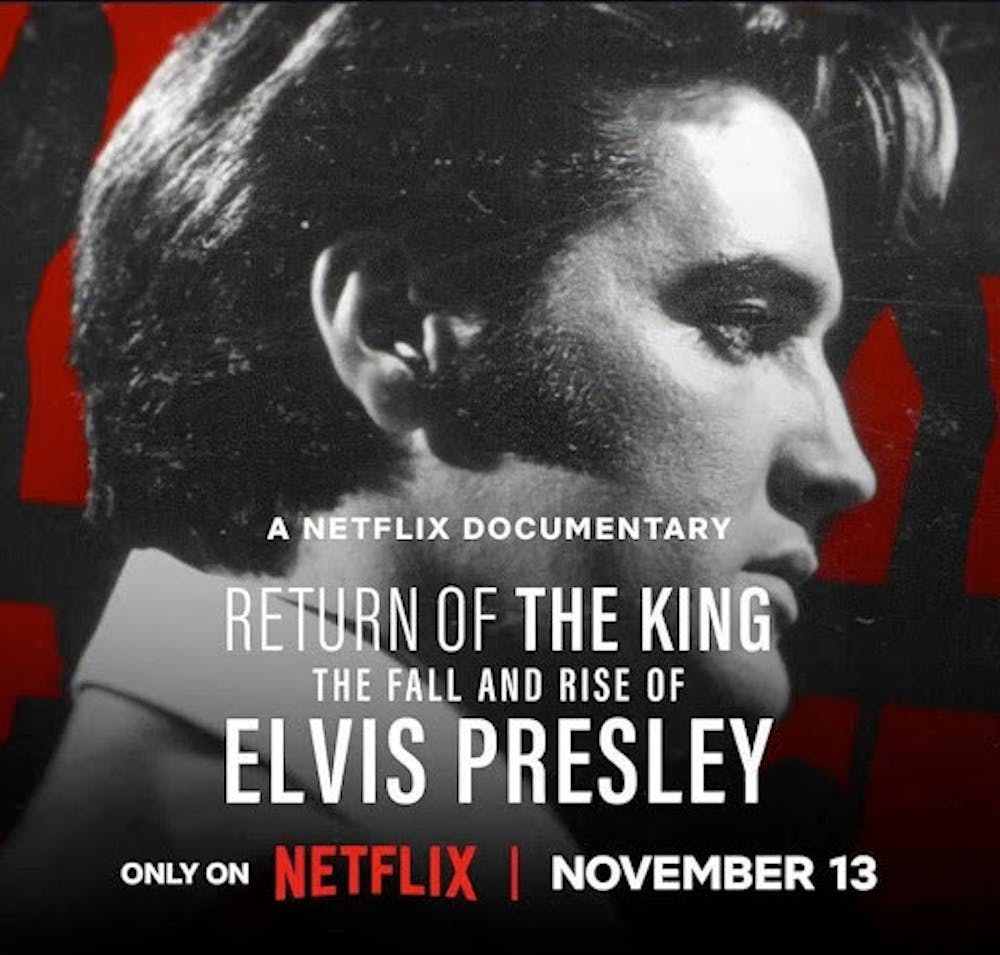By Ashley Ragone
Staff Writer
Elvis Presley faced a pivotal moment of his career in 1968. After a heightened focus on Hollywood musicals and over seven years of no live performances, his popularity was dwindling. The future of his musical relevancy rested in the hands of a CBS television special, which would determine whether audiences still held space for him as the performer he once was.
Netflix’s new documentary, “Return of the King: The Fall and Rise of Elvis Presley,” promises a deep dive into the making of this moment, offering an analysis of the context leading to his authentic reemergence. The documentary weaves behind-the-scenes footage of the taping with personal interviews to present a profile of Presley’s career beginnings, though it is slightly one-dimensional in its portrayal.
The documentary begins with Presley as a teenager, noting his first 1954 cover of “That’s All Right” by Arthur Crudup. Despite previous segregation within the music industry, his childhood upbringing in Mississippi and Memphis influenced his appreciation for Black music stylings. Presley’s genre-bending abilities allowed him to transcend existing barriers and reach a new, younger audience that was hungry for something fresh.
One of the more unexpected but insightful contributions came from Wright Thompson, a senior writer for ESPN. Though a surprising choice for the documentary, he offered his thoughts on the relationship between Colonel Tom Parker and Presley. Parker, who worked as the singer’s manager, “thought Elvis was merch” and wiped him of his authentic Southern roots.
Other notable interviews featured Jerry Schilling, a member of Presley’s Memphis Mafia friend group, and Bruce Springsteen, a fellow rock and roll singer. He spoke to Presley’s long-lasting influence for other rising artists, as he “gave you the allowance to be who you actually are.”
As the documentary progresses, it shows Presley as he is eventually drafted into the army and dips into silver screen productions. As he shifted into the Hollywood scene, he found commercial success in a formulaic pattern of musical-movies. The novelty of them started to fade though, especially with emerging artists like The Beatles overcasting Presley’s fame. Presley overall started to lose his appeal, and lost his place in the cultural zeitgeist.
This fall from glory set the scene for the 1968 CBS special, a significant moment of redemption for his career. The opener, “(If You’re Looking For) Trouble,” introduces the singer in all leather, with an electric energy and palpable confidence. Despite early filming nerves, his charisma is effortless and stunning. His finale of “If I Can Dream,” in a white suit with his name in neon lights, solidifies his comeback.
Thompon described Presley’s return to his roots as helping him to be “remembered today as one of the most quintessential American talents. And it is because there were moments when people saw.”
The success of his special was evident, with 42% of the American television audience tuning in to witness his brilliance. Its triumph marked the end of his decline, and he opened the door on a new, more authentic chapter of his career — though his death came not long after because of the drug abuse that was allowed by corrupt doctors and the business-oriented Colonel Parker.
While “Return of the King” provides viewers a framework through which to understand the context of Elvis Presley’s need for a comeback special, it ultimately lacks the depth and complex understanding that I felt was more present in other media, such as director Baz Luhrmann’s 2022 film “Elvis.”
Though some aspects were more fictionalized, that film took into account the negative role of Parker in the habits and choices of the singer. The documentary glosses over more nuanced aspects of his life, such as the financial exploitation of Presley and his chronic mistreatment of women. Nevertheless, it serves as a clear introduction to the singer’s story and allows for further exploration of his background.
“Return of the King: The Fall and Rise of Elvis Presley” succeeds in presenting a narrative of Presley’s life and career up to the 1968 CBS special that reintroduced his place in the music industry. It fell short of delivering more nuanced depictions of some aspects of his life, instead opting for a half-baked narrative of events or glossing over certain topics entirely.
Overall, Presley was a unique blend of his ancestral roots and fresh American desire, breaking boundaries across genres and inspiring countless artists after him. For someone looking to learn more about Presley and broad strokes of his career, this documentary is a solid portrayal of him.







